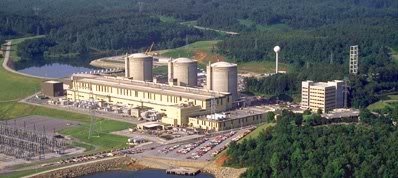Incident at Duke's S.C. nuke plant exposed workers to high radiation levels

A series of mishaps that occurred during a recent refueling outage at Duke Energy's Oconee nuclear plant near Greenville, S.C. exposed workers to dangerous levels of radiation, the Union of Concerned Scientists reports.
On April 12, the plant shut down for refueling -- the 24th such outage since the reactor began operating in the early 1970s. But practice clearly did not make perfect, as one mishap after another occurred during the 36-hour shutdown. By the time the outage was over, the company had damaged two reactor coolant pumps, unknowingly exceeded reactor cool-down limits, and triggered a potentially disastrous loss-of-coolant accident.
Personnel also managed to overlook -- for 8-1/2 hours -- an alarm indicating high levels of radiation inside the reactor containment building. As the warning signal blinked away in the control room, personnel opened the containment hatch and sent in workers to make repairs, exposing them to high levels of radioactivity.
In his analysis of the incident, UCS nuclear safety expert Dave Lochbaum called Duke's performance "shockingly poor":
The behavior during that 36-hour period contrasts sharply with the nuclear industry's safety themes of the past two decades: verbatim compliance with procedures, conservative decision-making, and STAR -- Stop, Think, Act, Review. "Verbatim compliance with procedures" represents the nuclear industry's version of "plan your work and work your plan." Workers are supposed to perform tasks per pre-approved procedures. Conservative decision-making seeks to expand rather than erode safety margins by always selecting the safest path from an array of options. STAR is a continuous self-check process protecting against any outcome other than being in the right place at the right time along the right path.
Duke violated procedures at some points and invoked the wrong procedures at other times. Duke made non-conservative decisions. And while Duke did indeed stop at times, think at others, act on occasion, and review at least once, there's an implicit quality component associated with these steps that eluded Duke repeatedly during those 36 hours.
Lochbaum praised the Nuclear Regulatory Commission's investigation into the incident for uncovering issues Duke's internal review team missed. He called on the agency to issue information about the event to other plant owners to help them avoid similar mistakes in the future.
The revelations about the mishaps at Oconee come as politicians are pushing for expanded nuclear power production. The offshore drilling legislation being considered by the Senate this week offers incentives for nuclear power companies. And just yesterday, U.S. Rep. J. Gresham Barrett (R-S.C.) held a press conference in front of the Oconee plant to announce his plan to boost nuclear energy production through tax incentives and a streamlined licensing process, GreenvilleOnline.com reports.
(Photo of Oconee Nuclear Station from Duke Energy's website)
Tags
Sue Sturgis
Sue is the former editorial director of Facing South and the Institute for Southern Studies.
